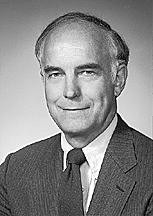

Information, for example, has become increasingly complex these days, and creates vast amounts of confusion. A great example occurred in February, when the government announced that it had created a large number of jobs, signaling the strength of the economy. The very same day, the Dow Jones average lost 175 points--the third biggest fall in history. Or take the news of the 40,000 layoffs at AT&T. That day, the stock market enjoyed one of its biggest gains ever.
"When one government office says the economy is doing well and the stock market loses, who can you believe?" says Williams. "Many times two government agencies will give conflicting views on the same topic, using the same information.
"This doesn't help. People don't know who to trust."
Thus, the rise of someone like Pat Buchanan. In February, Margaret Gordon, the dean of the Graduate School of Public Affairs, was a guest on a call-in show at conservative Seattle talk radio station KVI. As she sat in the studio in the Tower Building downtown, she was amazed to hear how many callers said they supported Buchanan--even when they didn't agree with him. They liked him, Gordon says, because he came across as someone who stood up for his beliefs and didn't waffle on any subject.
"The perception was that politicians changed their views all the time," says Gordon. "And that people would trust you if you are strong and believable, almost regardless of the specific views you held. I found that very interesting."
What she finds equally interesting, and depressing, is how the media and role of citizens has changed. A specialist in the role of the media and politics, Gordon says the media is "stuck between a rock and hard place. The media has to make money to survive and is convinced people aren't interested in serious information."
The media, she says, has focused on the "horse race" aspect of elections, rather than explaining policies and trends. "It's all about who wins and loses," she says. "People turn off. It is a sad situation."
And the lack of trust in government seems to infiltrate reporters' work as well. For instance, she points out in a recent study of newspaper stories about urban affairs, mayors were cited as authorities only two percent of the time.
She also cites other examples where newspapers have pulled reporters out of city hall, in essence sacrificing coverage that explains what goes on in city government. Instead these reporters only cover scandals and problems.
Gordon began uncovering these facts and feelings more than two years ago when she got the idea for the Trust in Government Project. Bothered by so many UW public affairs students avoiding careers in government, she and Williams decided to find out why. That quest led to the project, which earlier this year featured four conferences covering different aspects of trust in government.

"The electronic media's rise in recent years has made a huge impact," he says. "It tries to cover a complex story in 30 seconds and there is no detail. The sensationalism always seems to be about something bad.
"People have never in history really trusted government, and our government is set up to be that way. People always wonder why government isn't run like a business but it is designed not to have power concentrated in one place.
"We teach people to distrust government by what we say. Television has told us what stories are important.
"I am a skeptic of this rising tide of mistrust because people are fed it for so long. Talk radio is dependent on outrage or controversy, and it depends on television or newspapers for their story ideas. So they feed on one another.
"And in many issues, like school levies, the press has given equal coverage to a tiny handful of activists. That equal coverage tends to inflate the influence of the minority, and that has an impact on the election."
Getting Americans to Believe in Their Government
Again
Trust
in Government Project Website